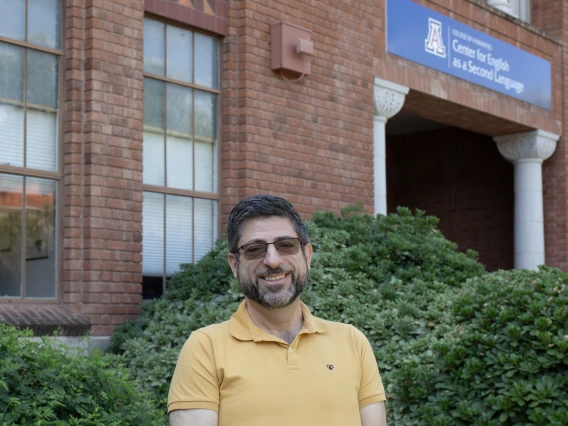
A career specializing in multilingual education unsurprisingly went multinational for Larry Berlin, but his new role brings him back to where he started.
Berlin earned his doctorate in Second Language Acquisition and Teaching from the University of Arizona in 2000, and while in the Ph.D. program, he also taught at the Center for English as a Second Language. And 24 years later, he’s now the director of CESL, taking over after Robert Côté retired.
Berlin returns to the U of A from Colombia, most recently, where he’s been Academic Director of Languages at EAFIT University. He’s also worked as an English Language Specialist for the U.S. Department of State in Dhaka, Bangladesh, and spent 17 years at Northeastern Illinois University in Chicago, where he was Professor of TESOL, English Language Program Coordinator, Director of International Programs, and Chair of the Department of Anthropology, Linguistics, Philosophy, and TESOL.
A language student as well as instructor, Berlin has studies Spanish, Danish, Italian, French, German, Swedish, Mandarin, Vietnamese and Russian.
“The reality is when you’re learning a second language, you’re not going to get it perfect. It takes a long time. For me, I tend to approach the languages I’ve learned best just by talking, even if the grammar isn’t right. People will correct you. It’s part of the communication process and the nature of how we engage with one another. We have to be willing to make mistakes,” he said.
Q: What sets CESL apart as a leading center in language education for more than 50 years?
"The comment I hear most is about the amazing teachers we have and the supportive structure they’re creating for their students. Everyone can succeed here. Our teachers have years of experience and expertise in the classroom and presenting through multiple modalities and they’ve honed their skills to perfection. Students can see our teachers’ commitment to their learning and that’s what makes them so effective. That’s why we’ve existed for 50 plus years and why we’ll continue for the next 50."
Q: How does language learning open more opportunities for students and graduates?
"In a very practical sense, we’ve seen an increase over the years of bilingualism being something that’s a minimum requirement for many jobs. The reality is, if you’re not studying a second language, lots of doors are going to be closed off to you. The type of access to information that comes through learning a second language, and processing it through culture, is not matched in any way, certainly not through an app, without going through that process yourself."
Q: What’s the importance of multilingualism and multilingual education in the 21st century?
"Having access to at least one other language, if not more, can only open up more possibilities for you. It’s essential for being engaged in this world and being open to new possibilities. Back in the 1990s and early 2000s, different studies suggested an increased elasticity and the potential for greater mind capacity in bilinguals and multilinguals. The ability to speak different languages and develop different perspectives beyond your own culture’s regarding the human condition enhances empathy and flexibility in 21st century skills, such as critical thinking and intercultural communication. Additionally, studies in reversing language shift profess that preserving endangered languages and access to those languages can prevent a loss of human knowledge."
Q: What role has the humanities played in your career?
"It’s difficult to say what the role of the humanities has been in my career, not just because of the breadth of the question, but because I don’t think we realize it on a daily basis. I have always considered myself an educator first and focused most of my work on social sciences and education. But it was through the people in the humanities that I got my core foundation, not just as an educator, but in life, because I really see the two tied together. Studying for my SLAT Ph.D. helped me to develop and solidify my philosophy about teaching and learning. I want to share and listen to ideas, instead of imposing them on people. I have taken this same humanistic approach to leadership and administration in education. Everybody has a voice and everybody has a perspective."

